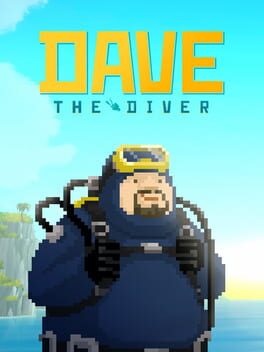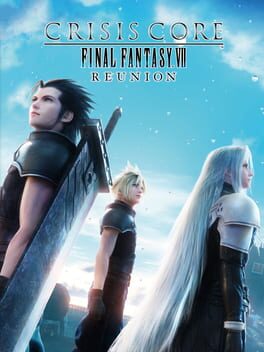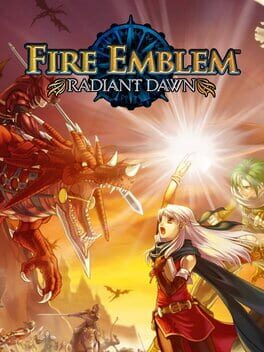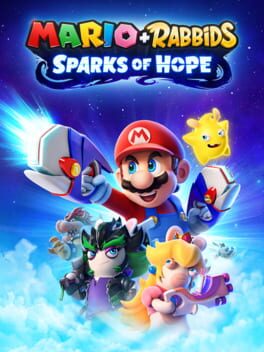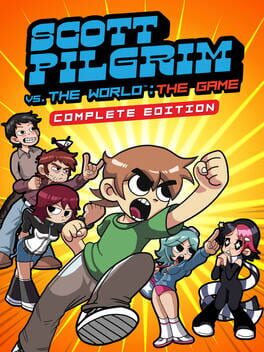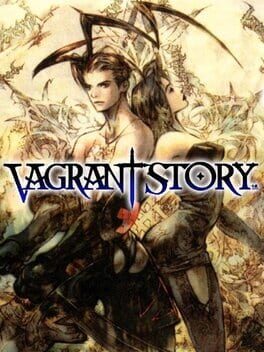yeahnahmatty
108 reviews liked by yeahnahmatty
Dave the Diver
2022
Fun premise, main story, and side hustle with the sushi restaurant. Found it very easy/fast at first, slows down to a better pace later. A lot to do; fishing, sushi quests, main quests, sea people quests, 3 different farms, collections, etc... Can be overwhelming but most can be ignored if desired. Overall a really fun play.
Dave the Diver
2022
Crisis Core: Final Fantasy VII - Reunion is a remaster of the game originally released for the PSP. It's an action RPG that tells the story before the events of Final Fantasy VII.
As a remaster, I can say it is a really well-done job. Even after 15 years, the developers took the original game and did a great job adapting it to modern days.
The visuals don't look outdated at all. It could easily be a game released today with a slightly smaller budget. It seems like they used some assets from the remake of Final Fantasy VII, although there's a significant difference between this prequel and the main title.
Regarding the gameplay, I can say that the combat is really enjoyable. The regular fights are quite easy, and you may encounter some difficulty with a few bosses, but nothing to worry about. It's almost like a 3D fighting game; you'll be walking through the stage and encounter enemies, triggering battles.
There are some RPG features that could make character development a bit more complex, but they're not necessary to progress in the game. You just need some basic knowledge about this system to enjoy the game.
As for the story, I really liked it. I never had contact with the original release or the original Final Fantasy VII. I only played the Final Fantasy VII remake before, and I can say that Crisis Core will be very important to the upcoming games of this remake era.
The characters are fun and charismatic, and the story kept me invested throughout.
I played on Nintendo Switch, and the developers did an amazing job with this version. I didn't encounter any problems during my gameplay.
In conclusion, Crisis Core: Final Fantasy VII - Reunion is a great opportunity to introduce this game to a new audience, like myself. It's a really fun game and probably an important story for the next parts of the remake era of Final Fantasy VII.
As a remaster, I can say it is a really well-done job. Even after 15 years, the developers took the original game and did a great job adapting it to modern days.
The visuals don't look outdated at all. It could easily be a game released today with a slightly smaller budget. It seems like they used some assets from the remake of Final Fantasy VII, although there's a significant difference between this prequel and the main title.
Regarding the gameplay, I can say that the combat is really enjoyable. The regular fights are quite easy, and you may encounter some difficulty with a few bosses, but nothing to worry about. It's almost like a 3D fighting game; you'll be walking through the stage and encounter enemies, triggering battles.
There are some RPG features that could make character development a bit more complex, but they're not necessary to progress in the game. You just need some basic knowledge about this system to enjoy the game.
As for the story, I really liked it. I never had contact with the original release or the original Final Fantasy VII. I only played the Final Fantasy VII remake before, and I can say that Crisis Core will be very important to the upcoming games of this remake era.
The characters are fun and charismatic, and the story kept me invested throughout.
I played on Nintendo Switch, and the developers did an amazing job with this version. I didn't encounter any problems during my gameplay.
In conclusion, Crisis Core: Final Fantasy VII - Reunion is a great opportunity to introduce this game to a new audience, like myself. It's a really fun game and probably an important story for the next parts of the remake era of Final Fantasy VII.
Persona 3 Reload
2024
As with many players, my introduction to the franchise was through Persona 5. During the pandemic, I played the game, and it quickly became my favorite of all time. It was somewhat amusing because I'm not typically into JRPGs or Japanese culture, but Persona has something truly unique about it. That's why Persona 3 Reload was my most anticipated game of the year, despite being a remake of an older title.
It's nearly impossible to review Persona 3 Reload without comparing it to Persona 5. Since its announcement, Persona 3 Reload seemed like the kind of remake that the Pokémon Company used to do with its older games. And I was right: Persona 3 Reload takes everything developed for Persona 5 and creates a true and good remake.
Persona 3 Reload is a classic Persona game that divides into two parts: your normal life as a student, and a hero's journey to save the world. In the first part, you attend school to study and interact with friends, while in the second part, you face enemies called shadows.
The social aspect of the game is particularly enjoyable. In addition to your duties as a student, you'll need to socialize with various characters from the school and rest of the world. Each character has a unique story, and you'll need to meet them multiple times to complete their storylines. This mechanic is called social links. Compared to Persona 5, I found these stories even more engaging.
The "hero part" is a turn-based RPG. I know that many people don't enjoy games of this style, but Persona games offer dynamic combat. Personally, I'm not usually a fan of turn-based games, but Persona takes the genre to another level.
Despite the game being split into two parts, they converge seamlessly. The interactions you have with friends will make you stronger to face enemies. The game operates on a calendar system, allowing you to decide when to hang out with friends, study, battle against enemies, or improve your social attributes.
The main story of the game starts strong, slows down a bit in the middle, and finishes perfectly. While I still prefer Persona 5's story, it's incredible how Atlus is able to create such incredible characters that are truly charismatic and make you care deeply about them. I enjoyed learning about their lives and backgrounds while also worrying about their futures.
I do think that Persona 3 Reload has some minor issues, such as poorly placed activities in the calendar system. There are moments where you have nothing to do for a few days, followed by days where you're overwhelmed with tasks. This became a problem near the end when I had enough money and maxed out all my social attributes. Additionally, I didn't appreciate how much time it took to start social links with party members, and that it was limited to just the female characters.
Another thing that is truly incredible in this franchise, and it holds true here as well, is the soundtrack. Persona 3 Reload boasts one of the best soundtracks ever in the gaming industry.
It took me 75 hours to finish my first playthrough, and I almost completed everything that could be done.
In conclusion, Persona 3 Reload is one of the best games we've had in recent years, but I still prefer Persona 5. If you enjoy JRPGs or Japanese culture, it's a must-play game. Even if you don't, I recommend giving it a chance, as I promise you won't be disappointed.
It's nearly impossible to review Persona 3 Reload without comparing it to Persona 5. Since its announcement, Persona 3 Reload seemed like the kind of remake that the Pokémon Company used to do with its older games. And I was right: Persona 3 Reload takes everything developed for Persona 5 and creates a true and good remake.
Persona 3 Reload is a classic Persona game that divides into two parts: your normal life as a student, and a hero's journey to save the world. In the first part, you attend school to study and interact with friends, while in the second part, you face enemies called shadows.
The social aspect of the game is particularly enjoyable. In addition to your duties as a student, you'll need to socialize with various characters from the school and rest of the world. Each character has a unique story, and you'll need to meet them multiple times to complete their storylines. This mechanic is called social links. Compared to Persona 5, I found these stories even more engaging.
The "hero part" is a turn-based RPG. I know that many people don't enjoy games of this style, but Persona games offer dynamic combat. Personally, I'm not usually a fan of turn-based games, but Persona takes the genre to another level.
Despite the game being split into two parts, they converge seamlessly. The interactions you have with friends will make you stronger to face enemies. The game operates on a calendar system, allowing you to decide when to hang out with friends, study, battle against enemies, or improve your social attributes.
The main story of the game starts strong, slows down a bit in the middle, and finishes perfectly. While I still prefer Persona 5's story, it's incredible how Atlus is able to create such incredible characters that are truly charismatic and make you care deeply about them. I enjoyed learning about their lives and backgrounds while also worrying about their futures.
I do think that Persona 3 Reload has some minor issues, such as poorly placed activities in the calendar system. There are moments where you have nothing to do for a few days, followed by days where you're overwhelmed with tasks. This became a problem near the end when I had enough money and maxed out all my social attributes. Additionally, I didn't appreciate how much time it took to start social links with party members, and that it was limited to just the female characters.
Another thing that is truly incredible in this franchise, and it holds true here as well, is the soundtrack. Persona 3 Reload boasts one of the best soundtracks ever in the gaming industry.
It took me 75 hours to finish my first playthrough, and I almost completed everything that could be done.
In conclusion, Persona 3 Reload is one of the best games we've had in recent years, but I still prefer Persona 5. If you enjoy JRPGs or Japanese culture, it's a must-play game. Even if you don't, I recommend giving it a chance, as I promise you won't be disappointed.
This was the first Fire Emblem game I ever played. I bought it after reading a review of it five hundred times in Official Nintendo Magazine (it might also have been the same exact volume of ONM that directed me towards Hotel Dusk, another one of my all-time favourite games - talk about getting your money's worth!), which described it as being like chess, only the pieces are all characters you care about. I'm paraphrasing, or maybe I’m misremembering - I haven't read that beautiful magazine in almost fifteen years. But this isn't a review of whatever # of ONM that was. This is a review of the hugely ambitious Fire Emblem: Radiant Dawn, a tough as nails grid-strategy turn-based fantasy RPG, bursting at the seams with delightful dialogue, intelligent plotlines, unforgettable music, interesting and sympathetic characters, and NUMBERS (my favourite thing). Thematically, it is one of the most thoughtful sequels in video games, concerned not so much with bigger, bolder, more bombastic action and set pieces, but with the political opportunism and humanitarian disasters that logically follow the events of the previous game. It is a burning star lighting up the black sky, the heat of its light still tickling the back of my neck fifteen years (approximately) later. It is also hugely misunderstood and, in some circles, maligned, like a weird younger brother with echolalia and a vindictive streak who wears your clothes all the time and has somehow kissed both more girls AND more boys than you have. Here are some of the criticisms I’ve seen directed at this game in the past: it is too unforgiving; there are too many characters; there is not enough VA; there is too much reading; the presentation is overly simple; it didn’t sell enough copies, nearly ending the franchise; etc; etc; etc. In light of these criticisms, (most of which I don't agree with, upon reflection,) I got used to thinking of Radiant Dawn as being one of those 7/10, middling games that I just so happened to like a lot, greasy junk food, an acquired taste. It took a decade and a half, it took playing Awakening, Three Houses, and Engage, to gain the perspective necessary to see this game as it is. And what is it? What is Radiant Dawn? Well, I’ll tell you. Radiant Dawn is the last good Fire Emblem game.
For a work that was, upon release, considered conservative and old fashioned, Fire Emblem: Radiant Dawn is a hugely ambitious title, juggling a massive cast of characters, careful worldbuilding, thrilling adventure, and enormous stakes, all while tying itself to Path of Radiance in looks and design so that they complement each other, so that they can be played and read as two parts of a whole, as the plot so requires; without Radiant Dawn, Path of Radiance feels incomplete, and vice versa. And what is the plot? Radiant Dawn takes place three years after the end of Path of Radiance and follows what happens to the land and citizens of Daein after their tyrant king is defeated and they are taken over by the holy state of Begnion. The Begnion military rules by the sword and is not afraid to turn its weapons against civilians. Corruption requires not a mad king, nor do war crimes require a Daein army. The game's themes begin to reveal themselves early; power corrupts, military rule is abuse, and prejudice, like heroism, can come from anywhere and anyone. In an incredible and challenging twist, (a twist that IGN called “odd” at the time, revealing more about the writer of that review than the game) you are no longer battling against the armies of Daein, but are tasked with freeing its people—innocent civilians caught in the to-and-fro of war, who have rapidly had to come to terms not only with the crimes of their own countrymen, which they almost certainly supported to some extent, but with the loss of their freedom. They impotently stare down the barrel of a gun at bullets of poverty, violence, shame. They are trapped under the boot. They are trapped forever. Children, adults, elderly, all trapped, all hungry, all afraid. It's completely brilliant, and harrowing.
You set off, a girl who can give your life force to heal others, a mirror of what your ragtag band of rebels are willing to give up in order to save their people, on a desperate mission to make Daein free once more. Your enemy is a rogue Begnion general placed in charge of keeping the peace, his loyal (read: fearful of sudden murder by General) soldiers, and the wealthy politicians pulling the strings from the shadows. Characters new and old, human and not, join you in this struggle. You and your little squad use careful tactics to bring down larger numbers, getting stronger and more confident all the while, raising the morale of everybody across the land. And what happens when you succeed? When Daein is free? The game continues, of course. In fact, at that point, the game has hardly begun. I recall thinking I was at the end of the game when I won back the Daein capital, all those years ago, and I couldn't believe that the game would just keep on going, and going, and going, tackling international and inter-racial tensions as it did so, its generosity as endless as its perma-death is awful.
One thing that gives me pause, I suppose, is the incredibly positive representation of monarchies, birthrights, etc throughout both this and Path of Radiance. I am sceptical of monarchies in much the same way that this game seems sceptical of politicians and governments - but to be fair, the politicians in this game are generally corrupt and working to amass wealth and power for themselves and their friends no matter who has to die for it, much like the Tories in the UK, so I sort of get where they're coming from. Anyway, this is the great thing about fiction. It let's you pretend. Doesn't it feel better to fantasise about a nice queen who will unite the land through peace and everybody will love her and each other, rather than cheering on governments who don't even pretend NOT to steal our money and bomb our neighbours and slowly degrade the human rights we've fought and marched and died for over the years? Anyway, my favourite thing about these games is all the gay subtext between--
Stop! Get offa me! The people must know!
The people!
Must!
Knnoooooooooowww~~!!!
(is never seen or heard from again)
For a work that was, upon release, considered conservative and old fashioned, Fire Emblem: Radiant Dawn is a hugely ambitious title, juggling a massive cast of characters, careful worldbuilding, thrilling adventure, and enormous stakes, all while tying itself to Path of Radiance in looks and design so that they complement each other, so that they can be played and read as two parts of a whole, as the plot so requires; without Radiant Dawn, Path of Radiance feels incomplete, and vice versa. And what is the plot? Radiant Dawn takes place three years after the end of Path of Radiance and follows what happens to the land and citizens of Daein after their tyrant king is defeated and they are taken over by the holy state of Begnion. The Begnion military rules by the sword and is not afraid to turn its weapons against civilians. Corruption requires not a mad king, nor do war crimes require a Daein army. The game's themes begin to reveal themselves early; power corrupts, military rule is abuse, and prejudice, like heroism, can come from anywhere and anyone. In an incredible and challenging twist, (a twist that IGN called “odd” at the time, revealing more about the writer of that review than the game) you are no longer battling against the armies of Daein, but are tasked with freeing its people—innocent civilians caught in the to-and-fro of war, who have rapidly had to come to terms not only with the crimes of their own countrymen, which they almost certainly supported to some extent, but with the loss of their freedom. They impotently stare down the barrel of a gun at bullets of poverty, violence, shame. They are trapped under the boot. They are trapped forever. Children, adults, elderly, all trapped, all hungry, all afraid. It's completely brilliant, and harrowing.
You set off, a girl who can give your life force to heal others, a mirror of what your ragtag band of rebels are willing to give up in order to save their people, on a desperate mission to make Daein free once more. Your enemy is a rogue Begnion general placed in charge of keeping the peace, his loyal (read: fearful of sudden murder by General) soldiers, and the wealthy politicians pulling the strings from the shadows. Characters new and old, human and not, join you in this struggle. You and your little squad use careful tactics to bring down larger numbers, getting stronger and more confident all the while, raising the morale of everybody across the land. And what happens when you succeed? When Daein is free? The game continues, of course. In fact, at that point, the game has hardly begun. I recall thinking I was at the end of the game when I won back the Daein capital, all those years ago, and I couldn't believe that the game would just keep on going, and going, and going, tackling international and inter-racial tensions as it did so, its generosity as endless as its perma-death is awful.
One thing that gives me pause, I suppose, is the incredibly positive representation of monarchies, birthrights, etc throughout both this and Path of Radiance. I am sceptical of monarchies in much the same way that this game seems sceptical of politicians and governments - but to be fair, the politicians in this game are generally corrupt and working to amass wealth and power for themselves and their friends no matter who has to die for it, much like the Tories in the UK, so I sort of get where they're coming from. Anyway, this is the great thing about fiction. It let's you pretend. Doesn't it feel better to fantasise about a nice queen who will unite the land through peace and everybody will love her and each other, rather than cheering on governments who don't even pretend NOT to steal our money and bomb our neighbours and slowly degrade the human rights we've fought and marched and died for over the years? Anyway, my favourite thing about these games is all the gay subtext between--
Stop! Get offa me! The people must know!
The people!
Must!
Knnoooooooooowww
(is never seen or heard from again)
Final Fantasy VII
1997
Rebirth did something so good that it finally cracked my inablity to see this game through to completion. I gotta preface that I played the Steam version with an absolute shit load of mods via the Seventh Heaven mod manager and it was honestly an all timer experience because of it. Happy to have seen it through and now I just wait for part three.
This is a decent sequel but sadly for me it was also kinda disappointing. Kingdom Battle was such an positive surprise and this new one has so many changes that just didn't work for me.
I really liked that the battle arenas were part of the main world in Kingdom Battle and all of them felt handcrafted. Now that battles take you to arena out of the main world, it makes everything feel randomly generated. It's not helping that there are more fights now and around 90% of those fights are stupidly easy and offer no challenge. Eventually I just skipped all fights that were not necessary. The new combat system itself is fine but there is just too much of it. I wish there was more variety with puzzles and stuff. I really enjoyed that aspect of this.
Switch itself is also really struggling with this one to keep even close to 30fps in open areas. This has also lost some of its charm on the visual front now that it needs to render bigger areas everything has less detail and looks somehow duller.
I really liked that the battle arenas were part of the main world in Kingdom Battle and all of them felt handcrafted. Now that battles take you to arena out of the main world, it makes everything feel randomly generated. It's not helping that there are more fights now and around 90% of those fights are stupidly easy and offer no challenge. Eventually I just skipped all fights that were not necessary. The new combat system itself is fine but there is just too much of it. I wish there was more variety with puzzles and stuff. I really enjoyed that aspect of this.
Switch itself is also really struggling with this one to keep even close to 30fps in open areas. This has also lost some of its charm on the visual front now that it needs to render bigger areas everything has less detail and looks somehow duller.
Vagrant Story
2000
one of the most interesting games I have ever played. The combat has Too much depth that it kind of hurts it for me in minor ways. Some stuff were pretty slow or outdated such as doing menu stuff in the game, but I still enjoyed the gameplay while I was learning more of its mechanics. The story is also pretty good, but I got lost on it a few times. If you are a hardcore fan of jrpgs, this is a game you should try out
